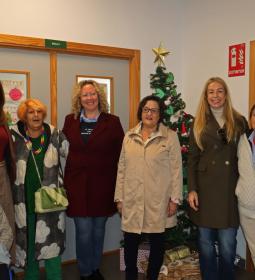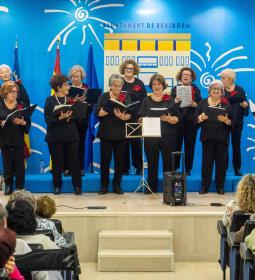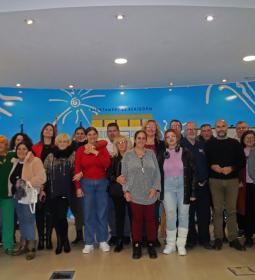The association recalls that more than half of those affected with rare diseases wait more than 6 years to achieve a diagnosis and be able to access treatments
Aerbeco demands faster diagnoses and more research and prevention on World Rare Disease Day

The Association of Rare Diseases of Benidorm and Region, Aerbeco, has commemorated World Rare Disease Day today in Benidorm demanding that public administrations make faster diagnoses for people affected by rare diseases, as well as greater research and prevention to stop their advancement and mitigate their consequences. The mayor of Benidorm, Toni Pérez, has participated in the reading of this protest manifesto, which has been read by the president of Aerbeco, Juan Miguel Martínez, accompanied by numerous councillors from the Municipal Corporation and members of this association.
During the reading, which took place in the municipal Assembly Hall, Martínez recalled that “more than half of families with rare diseases wait more than 6 years to achieve a diagnosis; especially if they are adults and women”, which in turn delays access to the treatments necessary to stop its progression.
After recalling that, according to the WHO, "prevention is not only preventing the appearance of the disease but also stopping its advance and mitigating its consequences once established", the president of Aerbeco recalled that in many rare diseases, it is possible to "exercise prevention: research to understand its origin, treatment possibilities and its impact; If we promote diagnostic programs that allow the disease to be identified early, we make access to pharmacological treatments and other types of therapies that prevent the worsening of the disease, promote its improvement or even its cure.
Likewise, he has emphasized that “prevention helps to minimize the clinical and social impact of rare diseases, but also the psychosocial consequences that the disease has on both the patient and his family. This impact is even greater in the cases of people without a diagnosis who, for years or even their entire lives, live with uncertainty about the origin, impact, evolution and treatment of the disease.”
To improve the management and treatment of this type of diseases, which affect between 6% and 8% of the world's population, Aerbeco proposes more determined work to "promote research, encouraging the sharing and dissemination of the knowledge generated among the research and professional community”; “implement measures that guarantee equitable access to diagnostic tests and the comprehensive care required”; “guarantee equitable access to medications and therapies”; and “provide support and continuity to the action of the associative movement that acts as a provider of services to patients where the Administrations do not reach.”
Finally, Juan Miguel Martínez recalled that this year marks the 25th anniversary of the Spanish Federation of Rare Diseases (FEDER), of which 418 organizations from all over the country are part, including Aerbeco.










